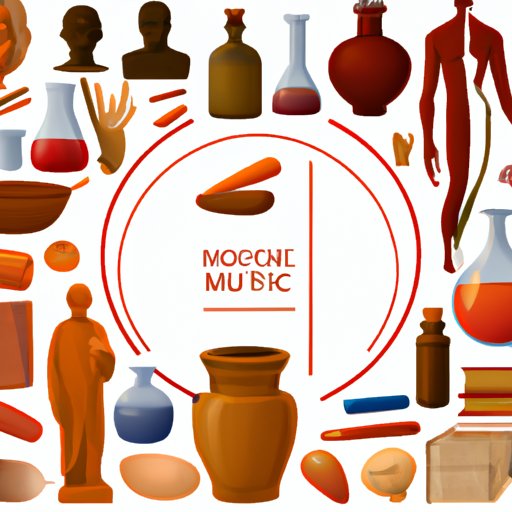
I. Introduction
Medicine is an essential aspect of our lives, an industry that impacts each and every individual in society. It is essential to comprehend the origin of medicine to gain an understanding of how far we have progressed and to appreciate the significant advancements that have been made in the field. The history of medicine is a fascinating story that stretches far back in time, beginning with the efforts of ancient civilizations to treat illnesses and develop cures. It is our responsibility to be aware of the origin and evolution of medicine.
II. Historical Timeline
Ancient civilizations, such as Egypt, Greece, and China, were pioneers in medicine, and their medical practices have been passed down to the present day. The invention of medicine was a gradual process that occurred over centuries, leading to key milestones in the field. Many of the significant discoveries took place in the intersection where math, science, and medicine met.
III. The Evolution of Medicinal Practices
The Greeks, Egyptians, and Chinese made significant contributions to the development of medicine. The Egyptians kept records of their medical practices, using natural remedies to treat illnesses. The Greeks contributed to the development of pharmaceuticals, while the Chinese focused on acupuncture and herbal treatments. Although their approaches were different, they shared a common goal of helping people recover from illnesses. Medical practices have evolved over time, becoming more sophisticated and scientific. The scientific method has been utilized to develop powerful treatments that are life-saving and pain-relieving.
IV. Milestones in Medicine
Modern-day medicine has progressed significantly, thanks to significant milestones, including the discovery of vaccines, the development of antibiotics such as penicillin, and anesthesia. Vaccines have been vital in treating and stopping the spread of illnesses, while penicillin has revolutionized the treatment of bacterial infections. Anesthesia has been a game-changer in surgical procedures, reducing patients’ pain and helping doctors undertake complex surgical procedures.
V. The Quest for Knowledge
The quest for knowledge has always driven humans to explore and learn. Early humans searched for remedies in nature and experimented with various substances to find a cure for illnesses. These were the first steps in the invention of medicine. Explorations to different parts of the world led to the discovery of new treatments and the spread of knowledge to other regions, contributing to the progress of medicine.
VI. Influence of Science and Religion
Religion and science have had a significant impact on medicine. Religious beliefs influenced early medical practices and played a role in the development of modern-day medicine. Science, too, has contributed significantly to the field. Scientific discoveries have led to new treatments, while beliefs have pushed the boundaries of knowledge, leading to new treatments and cures.
VII. Regional Approaches
The history of medicine invented in different regions of the world offers insight into the diverse approaches used. Each region has distinct medical practices that have been passed down through generations. For example, traditional Chinese medicine is different from Ayurvedic medicine from India. In contrast, Western medicine has been dominant in Europe and America. Each region has contributed significantly to medicine, and the impact of these contributions has been felt worldwide, making healthcare more efficient and effective.
VIII. Conclusion
Medicine has come a long way since ancient times, thanks to the contributions of early humans, the evolution of medicinal practices, religious beliefs, scientific discoveries, and different approaches in various regions. It is our responsibility to continue innovating and improving the field of medicine. Awareness of the origins of medicine is critical in understanding the progress that has been made and the challenges that lie ahead. We cannot take the progress made in the field for granted and must continue to seek new ways to provide better healthcare for everyone in society.




